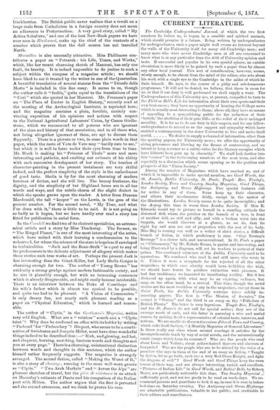Among the number of Magazines which have reached us, and
of which it is impossible to make special mention, are Good Words, the St. James's, Dublin University, St. Pads, Temple Bar, Tinsley's, London Society, Town and Country, Sunday Magazine, Good Things, the Antiquary, and Ocean Highways. Few special features call for notice in any of them. Some keep up their character, and others their no-character fairly, except in the matter of the illustrations. London Society seems to be quite incorrigible; and the Argosy this time is worse than London Society. If Miss E. Edwards would try to picture to herself in a standing attitude the distorted doll, whom she perches on the branch of a tree, in front of another doll, as stiff and silly, and with a broken wrist into the- bargain, she would discover at a glance, as we do, that its right leg and arm are out of proportion with the rest of its body. Miss Hay is coming out well as a writer of short stories, a difficult branch of fiction, in which proficiency is rare. "Guy Newton's Revenge " is a clever tale, and unconventional. In St. Pawls a paper on " Chiromancy," by Mr. Eubule Evans, is quaint and interesting, and being illustrated by a diagram, will set its readers to perusal of their palms. The continued existence of the Dublin University used to be- mysterious. We wondered who read it, and still more, who wrote in it. Unless it were a receptacle for the rejected of all the other magazines, in which case charity would have forbidden the wish, we should have learnt its painless extinction with pleasure. It had fine traditions ; we lamented its humiliating senility. But it has flickered up again, with what may be an expiring radiance, but may, on the other hand, be a revival. This time, though the serial' stories are the most worthless of any in the magazines, except those in Saint Pants, the Dublin University contains three solidly in- teresting papers. The first is "The Mission of Socrates," the second is " Ossian," and the third is an essay on the "Folk-lore of British Plants." The latter is very ingenious. Temple Bar, Tinsley's,. and the St. James's do not call for special notice ; they are of the average merit of each, and the latter is pursuing a wise and useful course, by making itself a representative of colonial taste, interests, and notions. We are unable to discern the raison d'et•e of Town and Country, which calls itself further, c. A Monthly Magazine of General Literature." Is there really any class whose mental cravings it satisfies by the incomprehensible trash by way of serial novels, and the unintentionally comic essays which form its contents? Who are the people who read about Lissa and Valinto, about yellow-haired dancers and showers of bouquets ? Who are the people who are to be stirred by the voice of a preacher who says to them at the end of an essay on fiction, " Taught by fiction, let us go forth, each one a very Red Cross Knight, and fight the dragons of evil "? Good Words and Good Things keep the even tenonr of their way, and are always interesting, varied, and excellent. "Pictures of Italian Life " in Good Words, and Babies' Bells, by Robert Major, are particularly noticeable this time. The Sunday Magazine ,) sufficiently good, and not too goody to be read on week-days. We re- commend parents and guardians to lock it up, in case it is sent in before bed-time on Saturday evening. The Antiquary and Ocean Highways are admirable publications, valuable to the public, and creditable to their editors and contributors.






























 Previous page
Previous page